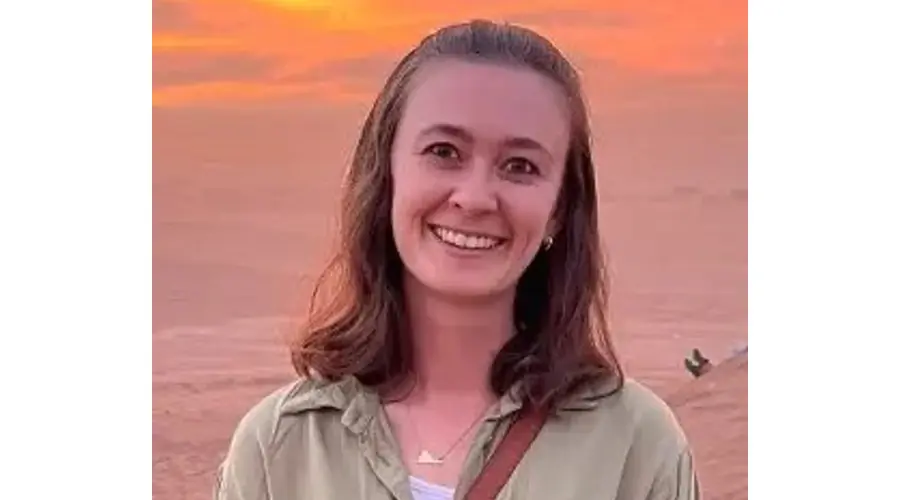Jamie Fico’s life was one of purpose, compassion, and determination–an exemplary case of someone finding their true passion and pursuing it with all of their heart. She unexpectedly passed away on November 5th, 2024, leaving behind her parents, sister, and a wide network of friends and colleagues who she had developed close bonds with across her life and work.
Growing up in Reston, Virginia, Jamie’s love for adventure started early and continued as she grew, influencing her decision to double major in Middle Eastern Studies and Global Security and Justice at the University of Virginia. Her undergraduate experience, only strengthened by her eagerness to address global challenges, prepared her well for an impactful career in international development.
Jamie’s service with the Peace Corps in Tighomar, a small village in the Draa Valley of Morocco, marked a pivotal moment in her life. Immersing herself in the community, she worked to empower local youth while also broadening her own knowledge of the local languages and traditions. Although her experience ended abruptly due to the pandemic, Jamie maintained a deep connection to the region and its people, a connection that stuck with her.
Jamie went on to pursue a Master’s degree in Geography from Syracuse University where she focused on water scarcity and sustainable agriculture in Morocco’s Draa Valley, an issue of critical importance for the well-being of thousands of people. Her graduate research illuminated the intersectional challenges faced by farmers navigating shifting water policies and environmental changes.
Jamie’s connection to Morocco remained strong, and she ultimately returned to the country as a Fulbright researcher to build on her graduate work by documenting traditional seed-saving practices, cataloging local crop varieties, and collaborating with women’s cooperatives and farmers organizations. She disseminated her findings across communities with the goal of emphasizing the importance of preserving cultural and agricultural heritage in the face of modern challenges.
Not only did Jamie make a tangible impact in the communities where she worked, but she also contributed to the larger body of knowledge surrounding critical sustainability issues through her many publications. In her publication titled, “Where Our Herds No Longer Wander”, Jamie explored the transition of the Misufa community in southern Morocco from pastoralism to agriculture, highlighting how watermelon farming has become both a lifeline and a source of environmental and social challenges. She advocates for placing a greater value on local ecological knowledge and diversified, sustainable agricultural practices.
She further explored the impact of the rise of watermelon farming in “Frontier of fortune: mobilizing land, water, and collective identity for watermelon production in Southeastern Morocco”, drawing on her interviews with farmers and residents from 2021-2023 who embraced watermelon production in an effort to promote agricultural growth. Yet instead as Jamie highlights, watermelon production has deepened gender and economic disparities within communities, favoring a small group of farmers who have access to capital. Addressing this critical issue of diminishing local land and water resources was a major focus of Jamie’s work, and she was able to help communicate valuable and insightful knowledge for larger audiences through publications like these.
The extensive research that Jamie conducted in a short period of time is highly reflective of her determination and high work ethic to address the issues that she held close to her. Also reflective of the caring and compassionate person she was is the deep interpersonal relationships she was able to build in the communities where she worked.
For us at the High Atlas Foundation, an organization founded by former Peace Corps Volunteers, Jamie represents an ideal driver of developmental change, someone who cares deeply about community empowerment first and foremost, designed and led by communities themselves. Whether collaborating with Moroccan farmers or amplifying the voices of women’s cooperatives, Jamie embodied the commitment to solutions that create lasting change.
The Fico family with the High Atlas Foundation have launched a community water infrastructure and tree planting project to honor Jamie’s legacy that reflect her vision for a sustainable and equitable future. Her life shows us that every effort, from planting a tree to conserving water to empowering people, has the potential to transform lives and landscapes for generations to come. As an organization looking to achieve the same mission in Morocco, HAF is grateful for the impact that Jamie has had on making everyone’s voice heard.
Kaitlyn Waring is a student at Northeastern University in Boston, USA, and she is currently volunteering with the High Atlas Foundation in Morocco.





